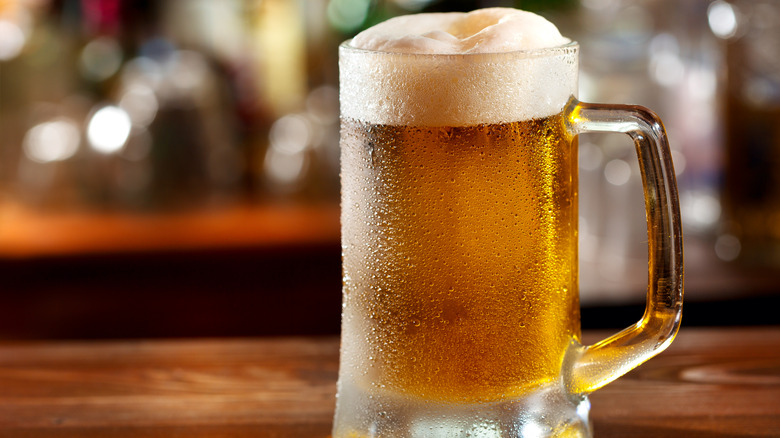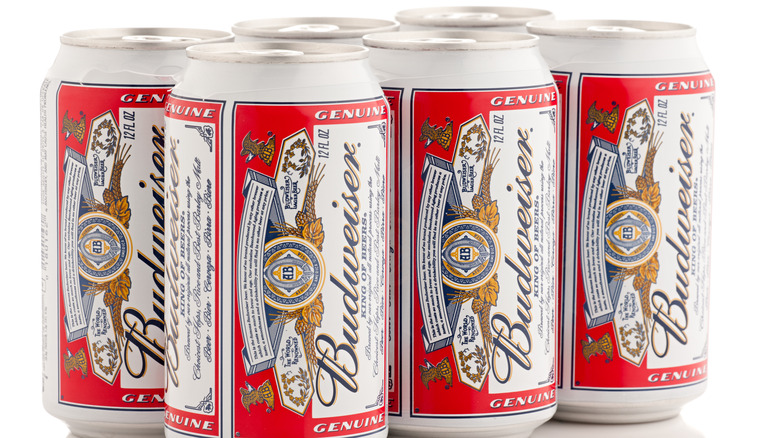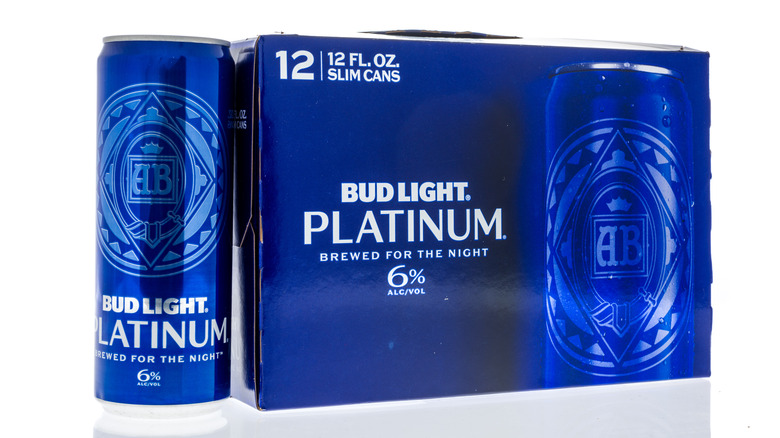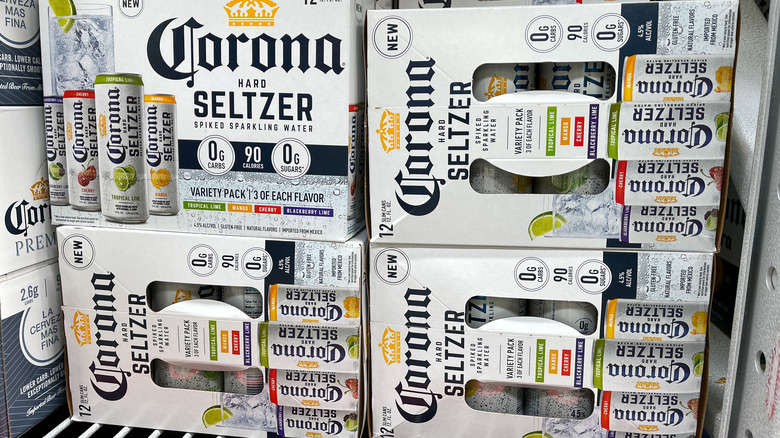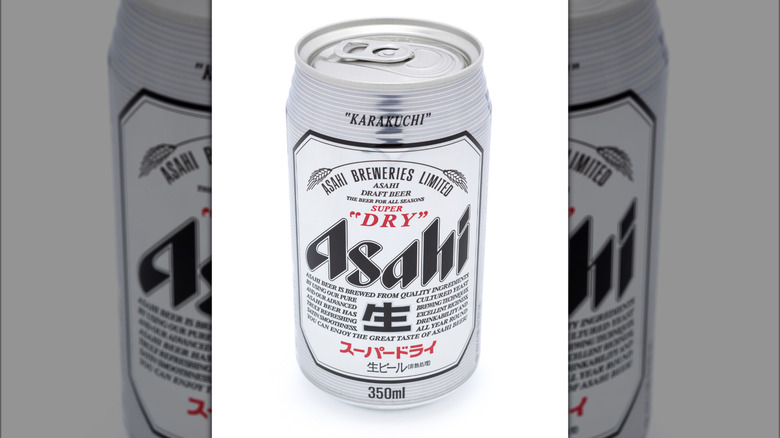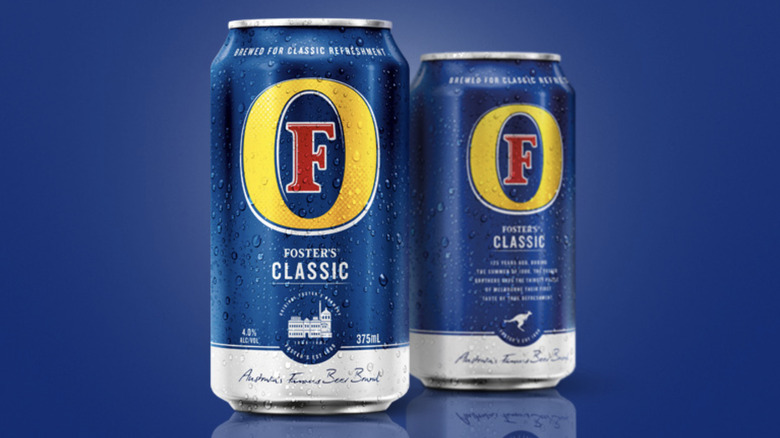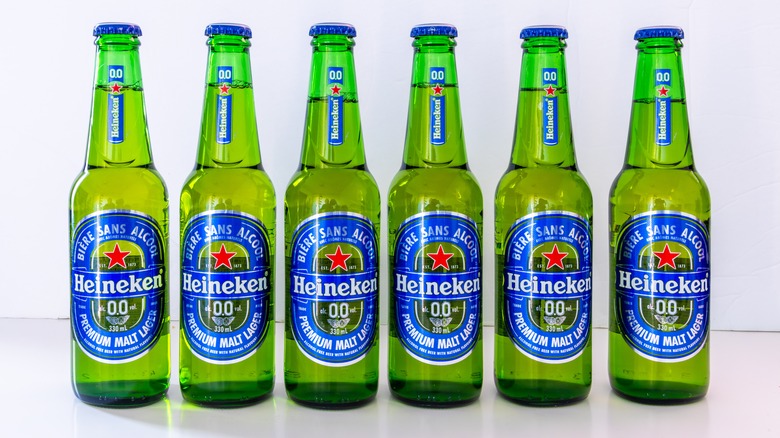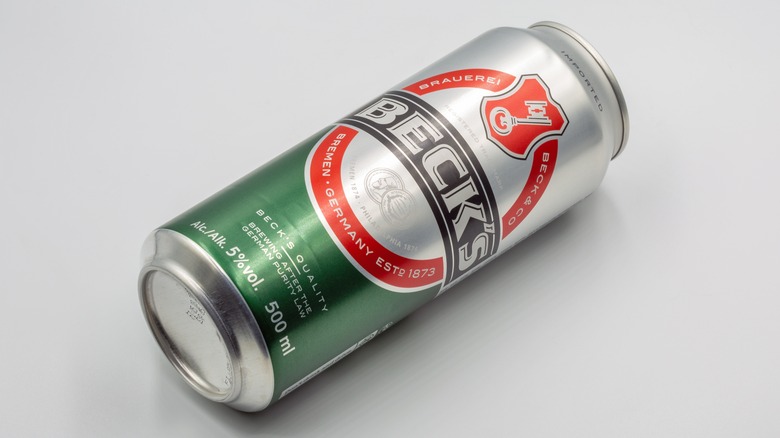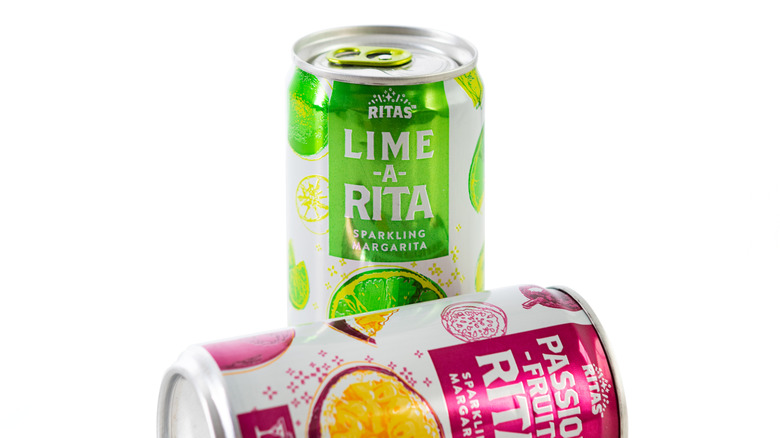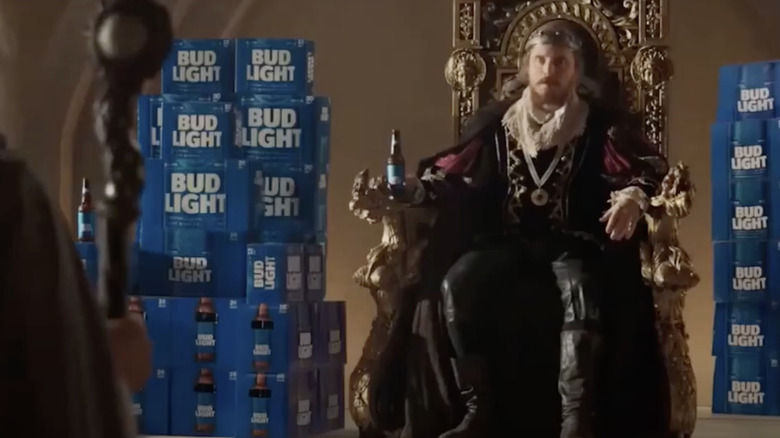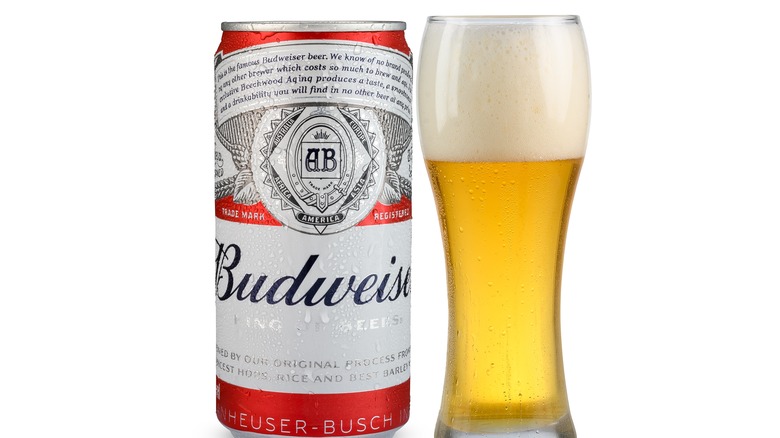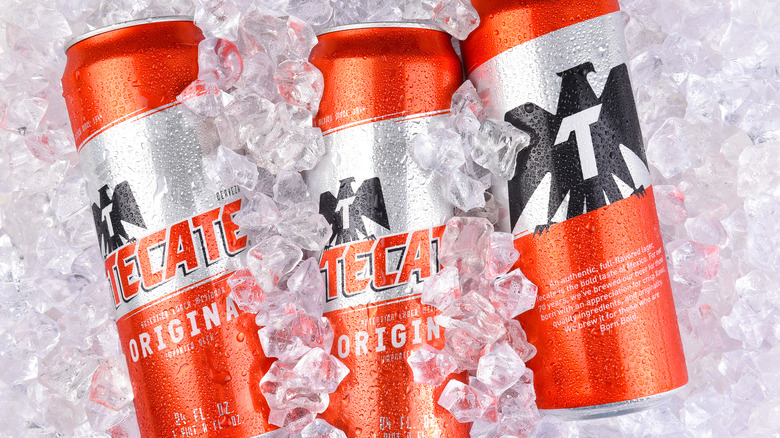The Biggest Lawsuits That Plagued The Beer Industry
There's nothing quite like a frosty beer on a balmy summer evening. Whether you're enjoying your favorite barbecued dishes with friends or simply unwinding after a busy day at the office, the golden hue and crisp taste of a quality brew are hard to beat. We often don't realize it, but what we choose to drink on those occasions is heavily influenced by brand names and advertising. From colorful labels to catchy slogans and jingles, beer marketing strategies can have a huge impact on our purchasing decisions.
Beer companies have perfected the art of linking their brews with specific lifestyles and experiences. This is often reflected in their advertising, packaging, and labeling. That being said, some beer brands don't always play fair. Beer companies have been known to employ misleading tactics to paint a picture of their products that has very little to do with reality or even misappropriate names and cultural symbols. And sometimes they have paid the price. Keen to find out about some of the biggest — and most interesting — lawsuits involving beer companies? Keep reading!
The battle over the Budweiser name
Legal disputes can go on for centuries, as demonstrated by the enduring conflict between the brewery that gave birth to Budweiser, Anheuser-Busch (now AB InBev), and a Czech brewery, Budejovicky Budvar, which produces Budweiser Budvar. The conflict can be traced back to the city of České Budějovice (Budweis in German) in modern-day Czech Republic. Renowned for its brewing tradition, the city has been producing beer since the 13th century, including Budweiser Bier, which translates to "Beer from Budweis" in German.
In the late 19th century, Adolphus Busch, the co-founder of Anheuser-Busch, started brewing a beer called Budweiser in the U.S. The beer was inspired by the brewing techniques of Bohemia, as attested to by Busch at a court hearing initiated by the state-owned Budweiser Budvar Brewery in 1896. "The idea was simply to brew a beer similar in quality, color, flavor and taste to the beer then made at Budweis," Busch testified at the time (via Mel Magazine).
In 1939, the two breweries came to a settlement that Anheuser-Busch would only sell its beer under the name Budweiser in North America, while breweries from Bohemia could use the name to sell their products in Europe. This is why Budejovicky Budvar sells its beer under the name Czechvar in the U.S. and AB InBev markets Budweiser as Bud in Europe. Unfortunately, this compromise hasn't been enough to satisfy AB InBev, which has continued to campaign for a territorial expansion of its Budweiser trademark.
A lawsuit alleged that Anheuser-Busch InBev waters down Budweiser
If you thought one class action lawsuit was a lot to deal with, just think of six. In 2013, the U.S. Judicial Panel on Multidistrict Litigation consolidated six class actions from different states, accusing Anheuser-Busch InBev (AB InBev) of watering down its beer and misrepresenting the alcohol content. Some of the labels named in the lawsuit included Bud Light Lime, Bud Light Platinum, Budweiser, Black Crown, Hurricane High Gravity Lager, and King Cobra. The class action sought millions in damages.
As reported by NBC News, the lead lawyer on the case, Josh Boxer, the lawsuit built on the insights provided by AB InBev's former employees, who alleged that the company regularly watered down its beer to reduce to increase profits. The vice president of brewing and supply at AB InBev at the time, Peter Kraemer, denied this accusation, stating: "Our beers are in full compliance with all alcohol labeling laws. We proudly adhere to the highest standards in brewing our beers, which have made them the best-selling in the U.S. and the world."
The class action suit was thrown out of court in 2014. In its motion for dismissal, AB InBev argued that malt beverages over 0.5% can be 0.3% above or below this standard, as regulated by the Alcohol and Tobacco Tax and Trade Bureau. According to AB InBev, its products were within this acceptable limit. The court clearly agreed.
The Corona Hard Seltzer and the beer definition lawsuit
Can seltzer be classified as beer? According to a New York federal jury, the answer is a resounding yes. The verdict, which was upheld on appeal in 2024, came after Anheuser-Busch InBev (AB InBev) and its Mexican subsidiary Grupo Modelo, initiated legal action against Constellation Brands for breach of agreement. More specifically, AB InBev alleged that Constellation Brands violated an agreement between the two parties by manufacturing Corona and Modelo hard seltzers. AB InBev asserted that under the terms of its agreement with Constellation, the beer producer could only distribute Modelo and Corona beer brands.
The case hinged on whether seltzer falls under the definition of beer. Constellation's argument rested on the premise that the agreement between the parties allowed them to produce "versions" of beer and malt beverages. The last time we checked, Merriam-Webster defined seltzer as "artificially carbonated water." While technically beer may fall under this definition, we recognize that seltzer lacks the ingredients and brewing process associated with beer — but that's just our humble opinion and certainly not representative of the outcome of this case.
Asahi: The not made in Japan lawsuit
If you think your Asahi has come to you from distant shores, you're in for a shock. This sentiment was shared by the plaintiffs who brought a class action against the brewing company for misleading practices in 2017. The plaintiffs in the lawsuit claimed that the marketing of the beer they purchased in California made beer enthusiasts believe that it had been brewed in Japan. In reality, the Asahi sold in the U.S. was produced in Canada by the Molson brewery. More specifically, the plaintiff claimed that the packaging, labeling, and advertising of the beer featured Japanese themes, including Japanese words and characters.
The plaintiffs argued that the belief that the beer was brewed in Japan led them to pay more for the product than they would have had they known it was produced in Canada. They also claimed that the Asahi brewed in Molson Coors breweries was made with water from that region, rather than water sourced by the chain of Asahi breweries in Japan. The dispute reached a settlement in 2019, when Asahi agreed to reimburse tipplers who bought the beer outside Japan between April 5, 2013 and December 20, 2018 for up to $10. In addition, under the terms of the settlement, Asahi was required to include the words "Product of Canada" on the label.
Foster's: The not made in Australia lawsuit
For many of us, Crocodile Dundee, kangaroos, and Foster's beer are often some of the first images that come to mind when thinking of Australia. However, not many of us are aware that Foster's isn't actually all that popular down under — it isn't even brewed there! As of 2012, all Foster's beer distributed in the U.S. has been produced by MillerCoors in Fort Worth, Texas.
In 2017, disgruntled Foster's lovers brought a lawsuit against MillerCoors, asserting that the marketing campaign for the beer made it seem that it was brewed in Australia. This included numerous cultural references, such as a kangaroo and the Southern Cross constellation that appears on the Australian flag. MillerCoors disagreed, alleging that the symbols and marketing campaign weren't equivalent to "an express claim" that the Foster's sold in the U.S. was produced in Australia. The brewing company also argued that each Foster's product included a disclosure about its place of production. In the end, the court sided with the defendant, stating that the disclaimer overshadowed any allusions that the beer might have been brewed in Australia.
Heineken faced a lawsuit over zero-alcohol marketing
People are becoming more health-conscious by staying active, eating nutritious food, and reducing their alcohol intake. Some brewing companies have responded to this trend by releasing non-alcoholic beers that taste very similar to their boozy counterparts. Heineken is no exception, launching its first alcohol-free offering in 2017. However, not everyone has been happy with Heineken's efforts. In 2021, a Louisiana woman brought legal action against Heineken USA, claiming that the marketing for Heineken 0.0 was misleading because the beer actually contains 0.03% alcohol.
According to the Tobacco Tax and Trade Bureau, the term "non-alcoholic" can only be used on beverages with under 0.5% alcohol. Meanwhile, the term "alcohol-free" can only be used on beverages with zero alcohol content. According to Heineken, its Heineken 0.0 contains under 0.03% alcohol, a trace amount that the company claims has no impact on the body. The Netherlands-based brewery has defended its labeling of the product, stating that the 0.03% alcohol content is a normal result of fermentation and is comparable to the alcohol levels in food products such as bread and bananas. Since we haven't been able to find any rulings in relation to this matter, it's likely that the case is still ongoing.
Beck's: The not made in Germany lawsuit
One beer enthusiast wasn't overly pleased to find out that the Beck's they were drinking wasn't produced in Germany, but in the good old U.S. of A. For those not in the know, the beer was brewed in Germany until 2012 when its production was moved to St. Louis, Missouri. Francisco Rene Marty was so incensed by this revelation that he decided to file a class action suit against the company behind the brew, Anheuser-Busch InBev. More specifically, the plaintiff took issue with some of the beer's labeling, which stated that it was of "German Quality" and "Originated in Bremen, Germany," giving the impression that it was imported from the European country.
In its defense, Anheuser-Busch InBev claimed that the beer's packaging contained the words "Product of USA, Brauerei Beck & Co., St. Louis, MO" and "BRAUERIE BECK & CO. BECK'S (c) ST. LOUIS MO.," thus alerting consumers to the fact that the beer was actually brewed in the U.S. Nevertheless, the brewery agreed to settle the case in 2015. In addition to offering reimbursements up to $50, the company also agreed to change its labeling to reflect the fact that the beer is produced in the U.S.
Lime-A-Rita: The no tequila lawsuit
Sometimes beer just isn't enough and a margarita is in order. Meet Anheuser-Busch's line of "Ritas," the answer to a margarita-flavored malt beverage on the go. Launched in 2012 with the Lime-A-Rita, today the line of alcoholic beverages also features the likes of Straw-Ber-Rita, Mang-O-Rita, and Water-Melon-Rita. Despite its suggestive name, the beverage doesn't actually contain any tequila, which is the main ingredient in a classic margarita recipe.
To say that some cocktail enthusiasts felt deceived by the canned "Rita" concoction's lack of tequila would be an understatement. In 2020, a class action lawsuit was filed against Anheuser-Busch InBev (AB InBev), alleging that the company's labeling of the beer-based drink line was misleading. AB InBev settled the case in 2021, allowing consumers who bought specific "Rita" beverages between January, 1 2018 and July 19, 2022 a partial refund of the purchase price up to $21.25 per household. According to Today, in 2022, AB InBev changed the packaging of its "Rita" line, adding the phrases "Sparkling Margarita" and "Malt Beverage" to the label.
Bud Light: The brewed with corn syrup lawsuit
In 2019, Anheuser-Busch InBev (AB InBev) caused a stir with an Super Bowl commercial suggesting that unlike its Bud Light, Molson Coors' Miller Lite and Coors Light were made with corn syrup. The ingredient — especially high-fructose corn syrup — carries negative connotations for many consumers due to its link with high blood pressure, obesity, and type 2 diabetes. The promotional campaign included the "Dilly Dilly" advertising, in which the Bud Light King tries to send back a wrongly delivered barrel of corn syrup to the castles of Miller Light and Coors Light.
Not surprisingly, Molson Coors sued AB InBev, alleging that the promotional campaign intended to mislead consumers into thinking that Miller Lite and Coors Light actually contain corn syrup. In fact, the company only used the ingredients in the fermentation process, but it doesn't actually appear in the beer. Nevertheless, corn syrup did feature on the beers' list of ingredients. At the end of the day, the court sided with AB InBev, stating that the company's advertising wasn't misleading and that "by choosing a word such as 'ingredients' with multiple potential meanings, Molson Coors brought this problem on itself" (via Arent Fox Schiff Law).
Budweiser was sued for alleged logo and slogan appropriation
In 2016, the Lumbee tribe of North Carolina sued Anheuser-Busch InBev and its beer distributor R.A. Jeffery for using its logo and slogan to advertise beer. The logo and the slogan "Heritage, pride and strength" appeared on AB InBev's products sold in the Lumbee territory. The distributor, which had been working with the beer giant since 1923, admitted to creating the advertising campaign, without the knowledge of AB InBev, with the intention of honoring "the rich heritage of the Lumbee Tribe."
The trademark infringement case reached a settlement the same year it was filed, with R.A. Jeffreys agreeing to make an undisclosed donation to Lumbee Land Development Inc., a nonprofit organization that supports educational and youth programs. Following the resolution, the Tribal Chairman Harvey Godwin made an announcement, stating, "The use of the Lumbee Tribe's trademarks in those ads was a mistake that arose out of a misunderstanding for which R.A. Jeffreys takes responsibility and apologizes. The Lumbee Tribe accepts that apology" (via The Robesonian).
Tecate beer: The not made in Mexico lawsuit
In 2020, a New York man sued Heineken for misleading consumers that its Tecate beer was brewed in Mexico while it was in fact produced in Holland. The Dutch beer company took over the operations of Mexico's Fomento Económico Mexicano in 2010. The plaintiff alleged that the brew was being falsely marketed as Mexican through the use of the words like "Original" and "Cerveza," the Meso-American typeface, and the Aztec eagle on the product's label. Notably, the product's labeling at the time also read "Product of Holland."
The Tecate website proudly proclaims: "Born in and inspired by the land we are proud to share our name with: Tecate, Baja California, Mexico." It also states that the Tecate beer has been brewed in the Mexican town for more than 60 years. While we haven't been able to verify the current status of the lawsuit, it seems that Mexico temporarily suspended its beer production during Covid-19 and this could be why Heineken moved the production of Tecate to Holland.
